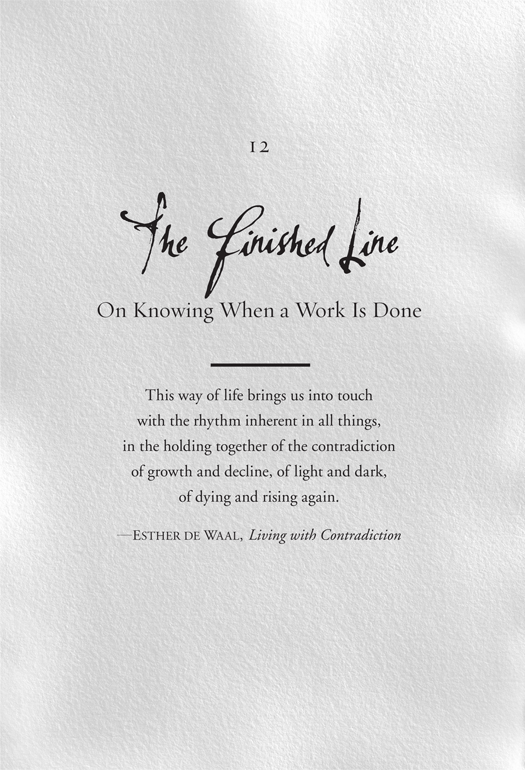

“HOW IS YOUR NEW BOOK COMING?” SOMEONE WILL say. People think a writer knows.
“I hate the thing.”
They always look at me with surprise.
“Don’t worry,” I say. “It means I am almost done.”
I know I am finished with a book when I never want to see it again.

One of my hopes for those who would write is that they get far enough along to know the joy of the moment when they hate what they are writing, as odd as the notion sounds. The arrival at the moment when writers hate the book they are writing means they have wrestled their way through a first draft—and the next four or five or six. They have wrestled all the way to the end, working along at whatever rhythm and pace they have discovered works best for them. They have discovered the first draft is more of a beginning than an end, and they have made the choice to carry on despite whatever obstacles turned up along the way.
Their berets went back on the shelf at the right times. They held a little ceremony or took a few dance steps.
They got up the next day. And then they started to do the next part of the work. And then they finished it off.

Finishing means they shoved their gamers down tight on their heads for the necessary number of days and weeks and months.
It means they spent some of their days digesting the pages the way a reader might, two to three hundred words at a time, knowing that if the writer cannot keep the writer turning the pages, there is little chance of keeping a reader turning the pages.
They spent time reading it to themselves and listening for the voice and the feel and the rhythm of the writing. And moving a piece to another page and switching sections around. They fell into a hole between chapters and realized the hole must be filled before the book can go on. They discovered that some cherished bit does not belong in this book after all and must be cut away. They spread out the pages on the table or the floor and sorted them for the second time or the twenty-second time, knowing there was a crack somewhere and the thing would not be done until the crack was patched.
“He who would do good to another,” writes William Blake, no stranger to writing worthy of being loved, “must do it in Minute Particulars.”
We who would write must love the work in particular ways—each phrase, each sentence, each paragraph, each story. Until we cannot stand to be in a room with it anymore.

We hold the fair copy in our hands, all clean and shiny, looking for all the world like a book, a book the jury might accept, a book a crowd of unknown people might like to read.
We have loved the thing all the way to the end.
We picked up our colored pencils to have at it again, over and over, until deep down a voice muttered, “I hate this collection of sentences, and I never want to see them again. I wish I had kept my mouth shut and never told anyone I was going to write this. I am tired of listening to myself.”
This is the moment when we just want this pile of ink and paper we have brought to life out of imagination and sweat and hope to go away and leave us alone. This is the moment when there is nothing in the world left to do but to let it go.
Congratulations. The work is finished. It is time to do a little dance. Have a long nap. Go for a swim. Go roll around in the September grass in the backyard.
Tomorrow it will be time to put on the fedora and find it a home.
And if you have worked at it long enough to hate the sight of it, I promise you will come to love it again some sweet day. That is when you will know you did a writer’s work.

This book is now finished.
Sylvia Plath, in a letter to a friend, passed on the quiet news of the weekend: “We stayed at home to write, to consolidate our outstretched selves.”
It is time for you and me to do the same.
When the question comes, “Are you still writing?” I hope your answer will always be, “Of course I am writing. I am a writer.”
That answer means you and I will always be traveling along together, even if our writerly journeys look different. Know I am honored to be walking along this road with you, even if our paths never cross.
Tomorrow the sun will rise, God willing, and it will be time again for us to go to our tables. It will be time to pick up the pen or turn on the machine or take up the colored pencil.
Tomorrow we will look our juries in the eye and continue telling them the stories we started out to tell. We will craft sentences that are honest and true. We will finish the day’s words and be artful enough to leave ourselves in a good place to do the next day’s work as well.
There are stories that must be told and must be heard, stories waiting on you and me to do the telling.
Tomorrow we will write, write and not waste time. We will make dark marks on the page, the gift to which we have been given, the gift that has been given to us.

Tomorrow we will go dancing again.
Dancing on the head of a pen.